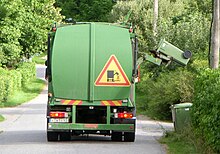Our website is made possible by displaying online advertisements to our visitors.
Please consider supporting us by disabling your ad blocker.
Waste management
This article has multiple issues. Please help improve it or discuss these issues on the talk page. (Learn how and when to remove these messages)
|
| Part of a series on |
| Pollution |
|---|
 |




Waste management or waste disposal includes the processes and actions required to manage waste from its inception to its final disposal.[1] This includes the collection, transport, treatment, and disposal of waste, together with monitoring and regulation of the waste management process and waste-related laws, technologies, and economic mechanisms.
Waste can either be solid, liquid, or gases and each type has different methods of disposal and management. Waste management deals with all types of waste, including industrial, biological, household, municipal, organic, biomedical, radioactive wastes. In some cases, waste can pose a threat to human health.[2] Health issues are associated with the entire process of waste management. Health issues can also arise indirectly or directly: directly through the handling of solid waste, and indirectly through the consumption of water, soil, and food.[2] Waste is produced by human activity, for example, the extraction and processing of raw materials.[3] Waste management is intended to reduce the adverse effects of waste on human health, the environment, planetary resources, and aesthetics.
The aim of waste management is to reduce the dangerous effects of such waste on the environment and human health. A big part of waste management deals with municipal solid waste, which is created by industrial, commercial, and household activity.[4]
Waste management practices are not the same across countries (developed and developing nations); regions (urban and rural areas), and residential and industrial sectors can all take different approaches.[5]
Proper management of waste is important for building sustainable and liveable cities, but it remains a challenge for many developing countries and cities. A report found that effective waste management is relatively expensive, usually comprising 20%–50% of municipal budgets. Operating this essential municipal service requires integrated systems that are efficient, sustainable, and socially supported.[6] A large portion of waste management practices deal with municipal solid waste (MSW) which is the bulk of the waste that is created by household, industrial, and commercial activity.[7] According to the Intergovernmental Panel on Climate Change (IPCC), municipal solid waste is expected to reach approximately 3.4 Gt by 2050; however, policies and lawmaking can reduce the amount of waste produced in different areas and cities of the world.[8] Measures of waste management include measures for integrated techno-economic mechanisms[9] of a circular economy, effective disposal facilities, export and import control[10][11] and optimal sustainable design of products that are produced.
In the first systematic review of the scientific evidence around global waste, its management, and its impact on human health and life, authors concluded that about a fourth of all the municipal solid terrestrial waste is not collected and an additional fourth is mismanaged after collection, often being burned in open and uncontrolled fires – or close to one billion tons per year when combined. They also found that broad priority areas each lack a "high-quality research base", partly due to the absence of "substantial research funding", which motivated scientists often require.[12][13] Electronic waste (ewaste) includes discarded computer monitors, motherboards, mobile phones and chargers, compact discs (CDs), headphones, television sets, air conditioners and refrigerators. According to the Global E-waste Monitor 2017, India generates ~ 2 million tonnes (Mte) of e-waste annually and ranks fifth among the e-waste producing countries, after the United States, the People's Republic of China, Japan and Germany.[14]
Effective 'Waste Management' involves the practice of '7R' - 'R'efuse, 'R'educe', 'R'euse, 'R'epair, 'R'epurpose, 'R'ecycle and 'R'ecover. Amongst these '7R's, the first two ('Refuse' and 'Reduce') relate to the non-creation of waste - by refusing to buy non-essential products and by reducing consumption. The next two ('Reuse' and 'Repair') refer to increasing the usage of the existing product, with or without the substitution of certain parts of the product. 'Repurpose' and 'Recycle' involve maximum usage of the materials used in the product, and 'Recover' is the least preferred and least efficient waste management practice involving the recovery of embedded energy in the waste material. For example, burning the waste to produce heat (and electricity from heat). Certain non-biodegradable products are also dumped away as 'Disposal', and this is not a "waste-'management'" practice.[15]
- ^ "Environment Statistics". United Nations Statistics Division. Archived from the original on 17 March 2017. Retrieved 3 March 2017.
- ^ a b Giusti, L. (1 August 2009). "A review of waste management practices and their impact on human health". Waste Management. 29 (8): 2227–2239. Bibcode:2009WaMan..29.2227G. doi:10.1016/j.wasman.2009.03.028. ISSN 0956-053X. PMID 19401266. Archived from the original on 25 November 2018. Retrieved 4 December 2020.
- ^ "Waste". Environment Statistics. United Nations Statistics Division. Archived from the original on 1 December 2017. Retrieved 3 March 2017.
- ^ "Wastes". U.S. Environmental Protection Agency. 2 November 2017. Retrieved 19 August 2023.
- ^ Davidson, Gary (June 2011). "Waste Management Practices: Literature Review" (PDF). Dalhousie University – Office of Sustainability. Archived from the original (PDF) on 1 February 2012. Retrieved 3 March 2017.
- ^ "Solid Waste Management". World Bank. Archived from the original on 30 September 2020. Retrieved 28 September 2020.
- ^ "Glossary of environmental and waste management terms". Handbook of Solid Waste Management and Waste Minimization Technologies. Butterworth-Heinemann. 2003. pp. 337–465. doi:10.1016/B978-075067507-9/50010-3. ISBN 9780750675079.
- ^ "Climate Change 2022: Mitigation of Climate Change". www.ipcc.ch. Retrieved 5 April 2022.
- ^ Gollakota, Anjani R. K.; Gautam, Sneha; Shu, Chi-Min (1 May 2020). "Inconsistencies of e-waste management in developing nations – Facts and plausible solutions". Journal of Environmental Management. 261: 110234. Bibcode:2020JEnvM.26110234G. doi:10.1016/j.jenvman.2020.110234. ISSN 0301-4797. PMID 32148304. S2CID 212641354. Archived from the original on 20 September 2021. Retrieved 27 February 2021.
- ^ Elegba, S. B. (2006). "Import/export control of radioactive sources in Nigeria". Safety and security of radioactive sources: Towards a global system for the continuous control of sources throughout their life cycle. Proceedings of an international conference. Archived from the original on 20 September 2021. Retrieved 27 February 2021.
- ^ "E –Waste Management through Regulations" (PDF). International Journal of Engineering Inventions. Archived (PDF) from the original on 16 July 2021. Retrieved 27 February 2021.
- ^ "Health crisis: Up to a billion tons of waste potentially burned in the open every year". phys.org. Archived from the original on 25 January 2021. Retrieved 13 February 2021.
- ^ Cook, E.; Velis, C. A. (6 January 2021). "Global Review on Safer End of Engineered Life". Global Review on Safer End of Engineered Life. Archived from the original on 22 February 2021. Retrieved 13 February 2021.
- ^ R. Dhana, Raju (2021). "Waste Management in India – An Overview" (PDF). United International Journal for Research & Technology (UIJRT). 02 (7): 175–196. eISSN 2582-6832. Archived (PDF) from the original on 24 June 2021. Retrieved 21 June 2021.
- ^ Sankar, Ajith (2015). Environmental Management. New Delhi: Oxford University Press. ISBN 9780199458912.
Previous Page Next Page


